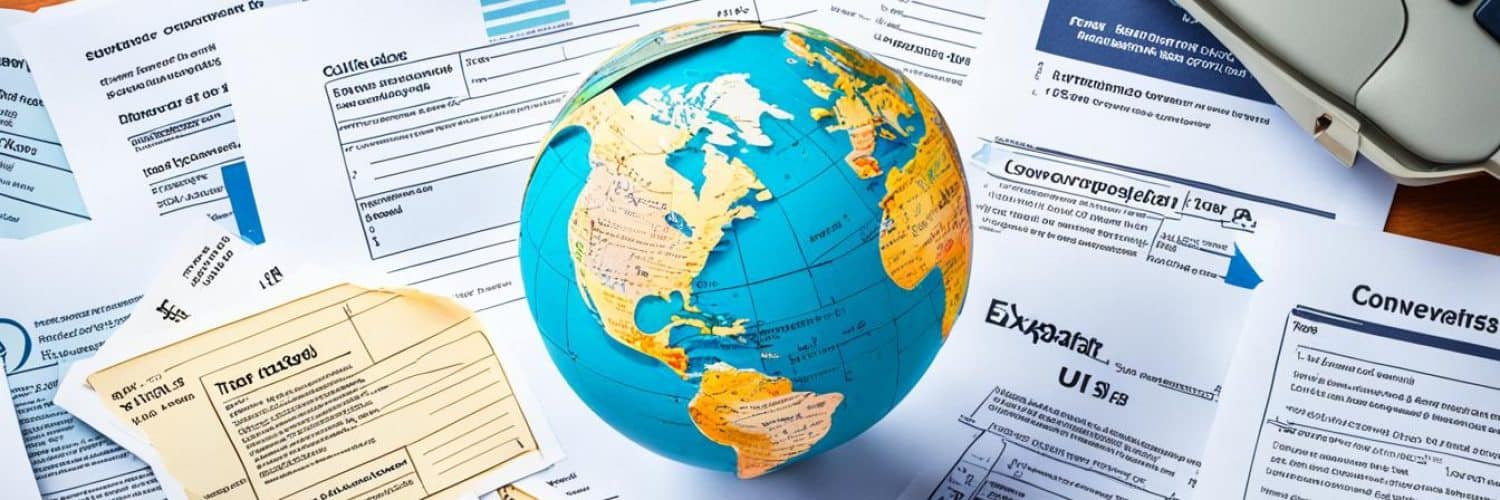Are you an American living abroad or considering a move to another country? It’s important to understand how the US taxes its citizens overseas. What are the filing requirements for expats? Which tax credits and deductions are available to reduce your US tax bills? And what are the potential penalties for non-compliance? In this article, we will provide you with essential tax guides to simplify your expat tax filing process and ensure compliance with the US tax laws.
Key Takeaways:
- Understanding US expat tax requirements is crucial for Americans living abroad.
- Expats must file US Federal Tax Returns annually, even if they don’t owe any tax.
- There are tax credits and deductions available to reduce or eliminate US tax liabilities for expats.
- Missing tax filing deadlines or non-compliance can result in penalties and potential legal consequences.
- Consulting with a tax professional who specializes in expat taxes can simplify the filing process and ensure compliance.
Filing Requirements for Expats
All American citizens, regardless of where they live in the world, must file a US Federal Tax Return. This means that expats are required to file their tax returns annually, even if they don’t owe any tax. There are specific income thresholds for filing, depending on the filing status (single, married, etc.), and even self-employed expats must file their tax returns.
Here are the key filing requirements for American citizens living overseas:
- All expats must file a US Federal Tax Return every year.
- Filing is mandatory even if you don’t owe any tax.
- Income thresholds for filing vary based on filing status.
- Self-employed expats are also required to file their tax returns.
“As an expat, it’s crucial to understand and comply with the filing requirements set by the US government. Failing to file your tax return can lead to penalties and other consequences. Make sure to stay informed and fulfill your obligations as an American citizen living overseas.”
Understanding the filing requirements is the first step towards ensuring compliance and avoiding penalties. It’s essential for expats to keep accurate records of their income, expenses, and any applicable tax forms. By staying organized and meeting the filing requirements, expats can fulfill their US tax obligations and avoid unnecessary stress.
Next, let’s explore the various tax credits and deductions that expats can take advantage of to minimize their US tax liability.
| Filing requirements for expats: |
|---|
| All American citizens must file a US Federal Tax Return annually |
| Even if you don’t owe any tax, filing is mandatory |
| Income thresholds for filing depend on your filing status |
| Self-employed expats are also required to file tax returns |
Tax Credits and Deductions for Expats
As an expat, you have access to valuable tax credits and deductions that can significantly reduce or even eliminate your US tax bills. Taking advantage of these tax benefits is essential in ensuring that you are not taxed twice on the same income and maximizing your tax savings.
One of the most valuable tax credits for expats is the Foreign Earned Income Credit (FEIE). This credit allows you to exclude a certain amount of your foreign earned income from US taxation. The FEIE is designed to reduce your taxable income and can result in substantial tax savings. For tax year 2023, the maximum exclusion amount is $120,000 for individuals and $240,000 for married couples filing jointly.
Another important tax benefit for expats is the Foreign Tax Credit (FTC). This credit allows you to offset the US taxes you owe by the amount of foreign taxes paid on the same income. The FTC is a dollar-for-dollar credit, meaning that every dollar of foreign tax paid reduces your US tax liability by an equal amount. By claiming the FTC, you can effectively reduce or eliminate your US tax bills.
Example: Foreign Earned Income Credit (FEIE)
To better understand the tax savings that can be achieved through the FEIE, consider the following example:
John, an American expat, earns $100,000 annually while living abroad. He qualifies for the FEIE and excludes the maximum exclusion amount of $120,000 from his taxable income. As a result, John’s taxable income is reduced to $0, and he owes no US taxes on his foreign earned income.
Additionally, there are other deductions and credits available to expats, such as the Child Tax Credit, the American Opportunity Credit for education expenses, and the Lifetime Learning Credit. These deductions and credits can further reduce your US tax bills and contribute to significant savings.
It’s important to note that claiming tax credits and deductions requires careful documentation and proper filing. Working with a knowledgeable tax professional who specializes in expat taxes can help ensure that you benefit from all available credits and deductions while remaining compliant with US tax laws.
| Tax Benefit | Description |
|---|---|
| Foreign Earned Income Credit (FEIE) | This credit allows you to exclude a certain amount of your foreign earned income from US taxation. |
| Foreign Tax Credit (FTC) | This credit allows you to offset your US tax liability with foreign taxes paid on the same income. |
| Child Tax Credit | A credit available to eligible parents to help reduce their tax liability based on their qualifying children. |
| American Opportunity Credit | A credit available to offset qualified education expenses of the taxpayer, spouse, or dependents. |
| Lifetime Learning Credit | A credit available for the qualified educational expenses of an eligible student. |
By taking advantage of these tax credits and deductions, you can significantly reduce your US tax bills and optimize your financial situation as an expat.
Filing Deadlines for Expats
As an expat, understanding the filing deadlines for your tax return is crucial to avoid penalties and interest. Expats have a different timeline than taxpayers living in the US, providing them with an automatic two-month extension from the regular April 15th deadline. This means that the expat tax return deadline is typically June 15th. However, it’s important to note that any taxes owed must still be paid by the original April 15th deadline to avoid penalties and interest.
Meeting the expat tax return deadline ensures that you fulfill your filing obligations and avoid any unnecessary complications with the IRS. It’s essential to plan ahead and gather all the necessary documents and information to complete your tax return accurately and on time.
| Tax Year | Regular Filing Deadline | Expat Filing Deadline |
|---|---|---|
| 2021 | April 15, 2022 | June 15, 2022 |
| 2022 | April 15, 2023 | June 15, 2023 |
| 2023 | April 15, 2024 | June 15, 2024 |
Remember, while the expat tax return deadline provides an extension to file your return, it does not extend the deadline for paying any taxes owed. To avoid penalties and interest, make sure to pay any taxes owed by the original April 15th deadline.

Penalties for Non-Compliance
Failing to file expat taxes as required can result in severe penalties. The Internal Revenue Service (IRS) takes non-compliance seriously and has a range of penalties for taxpayers who fail to fulfill their filing obligations. Here are some of the penalties that expats may face:
- Late Filing Penalties: The IRS can impose late filing penalties for each month that a tax return is late. The penalty amount can vary but is generally around 5% of the unpaid tax amount per month, up to a maximum of 25%.
- Late Payment Penalties: If an expat owes taxes but fails to make the payment by the due date, the IRS can impose late payment penalties. These penalties are typically 0.5% of the unpaid tax amount per month, up to a maximum of 25%.
- Accuracy-Related Penalties: If the IRS determines that an expat has made significant errors on their tax return that resulted in underpayment of taxes, they may impose accuracy-related penalties. These penalties can be up to 20% of the understated tax amount.
- Failure-to-Pay Penalties: If an expat fails to pay the taxes owed by the due date, the IRS can also impose failure-to-pay penalties. These penalties can be up to 0.5% of the unpaid tax amount per month, up to a maximum of 25%.
- Interest Charges: In addition to penalties, the IRS also charges interest on any unpaid tax amounts. The interest rate is determined quarterly and is based on the federal short-term rate plus 3%.
It’s important to note that penalties and interest can quickly accumulate, leading to significant financial burdens for non-compliant expats. In some cases, serious tax evaders and major delinquents can even face criminal charges and potential jail time.
“Complying with your US tax filing obligations is essential to avoid the potentially high costs of penalties and interest. Take proactive steps to meet the filing deadlines and accurately report your income to prevent unnecessary financial stress.”
To avoid penalties and ensure compliance with US tax laws, it’s recommended that expats seek professional advice from a tax specialist with expertise in international taxation. A tax professional can help navigate the complexities of expat taxes, provide guidance on available deductions and credits, and assist in preparing accurate and timely tax returns.
| Penalty Type | Penalty Amount |
|---|---|
| Late Filing Penalties | Up to 25% of unpaid tax amount per month |
| Late Payment Penalties | 0.5% of unpaid tax amount per month, up to 25% |
| Accuracy-Related Penalties | Up to 20% of understated tax amount |
| Failure-to-Pay Penalties | 0.5% of unpaid tax amount per month, up to 25% |
| Interest Charges | Federal short-term rate plus 3% |
Foreign Earned Income Exclusion (FEIE)
The Foreign Earned Income Exclusion (FEIE) is a valuable tax benefit that expats can utilize to exclude a certain amount of their foreign income from US taxation. By taking advantage of the FEIE, expats can significantly reduce their US tax liability and keep more of their hard-earned money.
To be eligible for the FEIE, expats must meet either the physical presence test or the bona fide residence test. The physical presence test requires expats to be physically present in a foreign country for at least 330 full days during a 12-month period. On the other hand, the bona fide residence test considers factors such as the length and nature of the expat’s stay, their intentions, and the establishment of a tax home in a foreign country.
The FEIE allows expats to exclude a maximum amount of their foreign earned income from US taxation. For the tax year 2023, the maximum exclusion amount is $120,000 for individuals and $240,000 for married couples filing jointly. This means that if an individual earns $100,000 in foreign income and meets the eligibility requirements, they can exclude the entire amount from their US tax return.
To claim the FEIE, expats must file Form 2555, which is specifically designed for reporting the Foreign Earned Income Exclusion. This form requires expats to provide details about their foreign income, the duration of their stay abroad, and other relevant information. It’s essential to accurately complete and submit Form 2555 along with the expat’s US tax return to ensure the proper application of the FEIE.
Foreign Tax Credit (FTC)
For expats looking to offset their US tax liability, the Foreign Tax Credit (FTC) provides a valuable solution. The FTC allows expats to claim a dollar-for-dollar credit for taxes paid to foreign countries. By utilizing this credit, expats can effectively reduce or even eliminate their US taxes owed, ensuring they do not pay tax on the same income twice.
To claim the FTC, expats need to file Form 1116, which details the foreign taxes paid and calculates the allowable credit. This form helps determine the eligible amount of foreign tax credit for each specific country where taxes were paid.
The Advantages of the Foreign Tax Credit
The Foreign Tax Credit offers several benefits:
- Reduction of US tax liability: The FTC provides a direct credit against US taxes owed, reducing the expat’s overall tax liability.
- Dollar-for-dollar credit: With the FTC, expats can claim a credit equal to the amount of foreign taxes paid, ensuring a full offset of taxes paid to other countries.
- Flexibility in claiming the credit: Expats can choose to use the Foreign Tax Credit instead of the Foreign Earned Income Exclusion (FEIE) if it results in a more advantageous tax position.
In essence, the FTC allows expats to mitigate any potential tax burden by utilizing the taxes paid to foreign countries as credits against their US tax liability. This ensures fairness and avoids double taxation for expats who earn income abroad.

| Advantages of Foreign Tax Credit | Limitations of Foreign Tax Credit |
|---|---|
|
|
Foreign Housing Exclusion
Expats who qualify for the Foreign Earned Income Exclusion (FEIE) have an additional opportunity to reduce their US tax liability through the Foreign Housing Exclusion. This valuable tax benefit allows expats to exclude eligible housing-related expenses from their taxable income, further lowering their tax bill.
Under the Foreign Housing Exclusion, expats can deduct a range of housing-related expenses associated with their foreign residence. These expenses may include rent, utilities, insurance, repairs, and even parking fees. By excluding these costs from their taxable income, expats can significantly reduce their overall US tax obligations.
To claim the Foreign Housing Exclusion, expats need to file Form 2555 along with their US tax return. This form provides detailed information about the housing-related expenses incurred during the tax year, ensuring accurate and compliant reporting.
It’s important for expats to keep proper documentation and receipts to support their housing-related expense deductions. By maintaining a record of these expenses, expats can substantiate their claims and provide evidence in case of an IRS audit.
Benefits of the Foreign Housing Exclusion
The Foreign Housing Exclusion offers several benefits for expats:
- Lower tax liability: By excluding eligible housing-related expenses, expats can significantly reduce their taxable income and lower their overall US tax liability.
- Greater financial flexibility: Deducting housing expenses can free up additional funds for expats to allocate towards other important financial obligations and goals.
- Supporting documentation: Filing Form 2555 with detailed housing-related expense information helps expats maintain accurate financial records and can provide a clear audit trail if required.
It’s important for expats to consult with a tax professional who specializes in expat taxes to ensure they fully understand the eligibility requirements and how to properly claim the Foreign Housing Exclusion. By leveraging this valuable tax benefit, expats can further optimize their US tax situation and mitigate their financial obligations.
Note: The image above is for illustrative purposes only and does not represent actual housing expenses.
Next, let’s explore the obligations expats may have regarding state taxes in Section 9.
State Tax Obligations for Expats
While expats are primarily concerned with their federal tax return obligations, it’s essential not to overlook potential state tax obligations. Depending on an expat’s residency status and income sources, they may be required to file state tax returns in addition to their federal tax return.
Each state has its own rules for determining residency, and expats should be aware of the criteria that may trigger state tax filing requirements. Some common factors include retaining a driver’s license, owning property, maintaining a mailing address, or spending a significant amount of time in the state.
An expat’s state tax obligations will be determined based on their state of last residence in the United States. It’s important to note that even if an expat no longer maintains a physical presence in a particular state, they may still be considered a resident for tax purposes if they meet the state’s residency criteria.
To determine state tax obligations, expats should consult the residency rules of their state of last residence or seek guidance from a tax professional familiar with expat tax matters. Understanding and fulfilling state tax obligations will help ensure compliance and avoid potential penalties.
Tax Treaty Benefits for Expats
The United States has entered into tax treaties with many countries around the world to reduce double taxation and provide clarity on which country has the right to tax specific types of income. These tax treaties play a crucial role in minimizing the tax burden on expats and ensuring fairness in the global tax system.
One of the primary objectives of tax treaties is to eliminate the possibility of being taxed on the same income by both the US and the expat’s country of residence. These treaties establish rules that determine which country has the taxing rights on various types of income, such as employment income, rental income, or capital gains.
By using tax treaties, expats can take advantage of favorable provisions to reduce their overall tax liability. These provisions can include lower tax rates, exemptions, or credits for taxes paid in the other country. For example, if an expat’s country of residence has a lower tax rate on certain types of income, the tax treaty can ensure that the expat pays tax at the lower rate.
It’s essential for expats to understand and utilize the tax treaty benefits available to them to maximize their tax savings and avoid double taxation. Consulting with a tax professional who specializes in international taxation can help expats navigate the complexities of tax treaties and ensure compliance with both US and foreign tax laws.
“Tax treaties provide valuable opportunities for expats to reduce their tax burden and ensure they are being taxed fairly. By leveraging these treaty benefits, expats can minimize the impact of double taxation and optimize their international tax planning.”
Benefit Example: Lower Tax Rates
One of the key benefits of tax treaties is the potential for reduced tax rates. Let’s consider an example:
| Country | Tax Rate |
|---|---|
| United States | 20% |
| Expat’s Country of Residence | 15% |
In this scenario, the tax treaty between the US and the expat’s country of residence may stipulate that the maximum tax rate on certain types of income is 15%. This means that the expat would pay tax at the lower rate of 15% rather than the higher US rate of 20%, resulting in significant tax savings.
It’s important to note that tax treaties can be complex, and their provisions may vary with each country. The eligibility criteria and specific benefits outlined in a tax treaty depend on the individual’s circumstances, such as their nationality, country of residence, and the type of income earned.
Ultimately, leveraging tax treaty benefits requires a thorough understanding of the applicable treaty provisions and careful tax planning. Seeking professional advice from a tax expert is highly recommended to ensure compliance and maximize the tax advantages available.
Renouncing US Citizenship
While some expats may consider renouncing their US citizenship as a means to avoid the burden of US tax filing, it’s important to be aware of the tax implications and consequences that accompany such a decision.
Renouncing US citizenship can trigger an exit tax, also known as the expatriation tax, which is designed to capture unrealized gains in assets owned by the expat at the time of renunciation. The exit tax applies to expats who meet certain asset or income thresholds defined by the US tax law.
Additionally, renouncing US citizenship does not automatically absolve individuals from their US tax obligations. In fact, expats who choose to renounce their citizenship may still have continuing US tax obligations for a certain period of time, depending on their circumstances. This can include reporting and paying US taxes for a specified number of years following the renunciation.
Therefore, it’s crucial for expats to fully understand the tax implications of renouncing their US citizenship and to consider all factors before making a decision. Consulting with a tax professional who specializes in expat taxes can provide expert guidance and help navigate the complexities involved.

| Tax Implications of Renouncing US Citizenship | Continuing US Tax Obligations |
|---|---|
|
|
Filing Deadlines for Expats
Expats, just like taxpayers living in the US, have certain tax deadlines to meet when filing their expat tax returns. The typical deadline for filing taxes in the US is April 15th. However, expats are granted an automatic two-month extension, extending their deadline to June 15th. This additional time allows expats living abroad to gather the necessary documents and information required for filing their tax returns accurately.
If expats still need more time beyond the June 15th deadline, they can request an additional extension by filing either Form 4868 (Application for Automatic Extension of Time to File U.S. Individual Income Tax Return) or Form 2350 (Application for Extension of Time to File U.S. Income Tax Return). These forms provide expats with the flexibility to obtain extra time for completing their tax returns.
It’s crucial to note that while the filing deadline can be extended, any taxes owed must still be paid by the original April 15th deadline. Failure to do so may result in penalties and interest accumulating on the outstanding tax balance. Therefore, expats should strive to pay their taxes in full by the original deadline to avoid unnecessary financial burdens.
To ensure that you comply with the expat tax return deadline and meet all necessary requirements, it’s recommended to consult with a tax professional experienced in filing expat taxes. They can provide expert guidance, help you navigate the complexities of the tax system, and ensure you fulfill your tax obligations accurately and on time.
Having a clear understanding of the expat tax return deadline and the options available for extensions can alleviate potential stress associated with filing expat taxes. Remember to adhere to the deadlines, request additional extensions if needed, and pay any taxes owed by the original deadline to stay compliant with the US tax regulations.
Streamlined Filing Compliance Procedures
The Streamlined Filing Compliance Procedures is an amnesty program offered by the IRS that allows expats to come into compliance with their US tax obligations without facing penalties. This program is specifically designed for expats who were unaware of their US tax filing obligations and provides an opportunity for penalty-free compliance.
To qualify for the Streamlined Filing Compliance Procedures, expats must meet the following requirements:
- Self-certify that their failure to file US tax returns and report foreign financial accounts was not willful.
- File the last three delinquent tax returns for the previous three years.
- Report any foreign bank accounts they have held in the past six years by filing the required FBAR reporting.
Key Benefits of the Streamlined Filing Compliance Procedures:
- Penalty-free compliance: By participating in the Streamlined Filing Compliance Procedures, expats can avoid costly penalties that may otherwise be imposed for failing to file tax returns and report foreign financial accounts.
- Resolution of delinquent tax returns: Expats can bring their tax filing obligations up to date by filing the last three years’ delinquent tax returns.
- FBAR reporting: The program also allows expats to report any previously undisclosed foreign bank accounts by filing the required FBAR reporting for the past six years.
Participating in the Streamlined Filing Compliance Procedures provides expats with the opportunity to rectify their tax compliance situation and achieve peace of mind. It’s important for expats to consult with a tax professional who specializes in international tax matters to ensure they meet all the requirements and properly navigate the streamlined filing process.
Amending Tax Returns
If an expat discovers that they made a mistake on a previously filed tax return, there is a solution available. They can file an amended return using Form 1040-X, which allows expats to correct errors, report additional income, and claim missed deductions.
Amending a tax return is an important step towards ensuring accurate reporting and avoiding potential penalties. By using Form 1040-X, expats have the opportunity to rectify any errors or omissions that may have occurred on their original tax return.
When filing an amended return, it’s essential to provide the correct information and supporting documentation. This may include updated financial records, additional income documentation, or any other relevant details that were not previously included in the original tax return.
Expats should be aware that not all types of income can be amended. For example, income reported on a previous tax return using the Foreign Earned Income Exclusion (FEIE) cannot be amended. It’s important to carefully review the IRS guidelines and regulations to determine which types of income can be amended.
The deadline for filing an amended return is typically three years from the original filing deadline. However, expats should consult the IRS website or seek the advice of a tax professional for the most up-to-date information regarding deadlines and requirements.
Correcting errors and reporting additional income through an amended return can have a significant impact on an expat’s tax liability. By claiming missed deductions, expats may be eligible for a reduction in their overall tax bill, potentially resulting in a refund or a lower tax payment.
It’s important for expats to be thorough and accurate when amending their tax returns. While mistakes can happen, taking the time to correct them shows a commitment to compliance and responsible tax reporting.
| Benefits of Amending Tax Returns: |
|---|
| 1. Correcting errors and omissions. |
| 2. Reporting additional income. |
| 3. Claiming missed deductions. |
| 4. Reducing overall tax liability. |
| 5. Avoiding potential penalties and interest. |
Amending tax returns using Form 1040-X provides expats with an opportunity to rectify any mistakes and ensure accurate tax reporting. By reporting additional income, claiming missed deductions, and correcting errors, expats can reduce their tax liability and avoid potential penalties and interest. It is important for expats to familiarize themselves with the requirements and deadlines for filing an amended return to ensure compliance with the IRS regulations.
Conclusion
Understanding US expat taxes can be complex, but fortunately, there are resources available to simplify the filing process. Expats should be aware of their filing requirements, including the need to file a US Federal Tax Return regardless of where they reside. By familiarizing themselves with available tax credits and deductions, expats can take advantage of opportunities to reduce their US tax liabilities.
It is crucial for expats to be mindful of filing deadlines to avoid penalties for non-compliance. The automatic two-month extension until June 15th provides some relief, but it’s important to remember that any taxes owed must still be paid by the original April 15th deadline.
To navigate the intricacies of US expat taxes successfully, it is advisable to seek expert advice from a qualified tax professional who specializes in expat tax matters. They can provide personalized assistance, ensuring a smooth and compliant filing process. By partnering with an expert, expats can access valuable guidance and resources to help them meet their tax obligations efficiently and accurately.
FAQ
What are the filing requirements for American citizens living abroad?
All American citizens, regardless of where they live, must file a US Federal Tax Return annually, even if they don’t owe any tax. There are specific income thresholds for filing, and even self-employed expats must file their tax returns.
What tax credits and deductions are available for expats?
Expats have access to several tax credits and deductions, including the Foreign Earned Income Credit (FEIE) and the Foreign Tax Credit (FTC). These credits and deductions are designed to reduce or eliminate US tax bills for expats.
What is the deadline for expat tax returns?
The deadline for expat tax returns is typically June 15th, giving expats an automatic two-month extension from the regular April 15th deadline. However, any taxes owed must still be paid by the original April 15th deadline to avoid penalties and interest.
What are the penalties for not filing expat taxes?
Failing to file expat taxes as required can result in severe penalties. The IRS can impose late fees and penalties for each month that a tax return or tax payment is late. In some cases, serious tax evaders and major delinquents can even face criminal charges and potential jail time.
What is the Foreign Earned Income Exclusion (FEIE)?
The Foreign Earned Income Exclusion (FEIE) is a tax benefit that allows expats to exclude a certain amount of their foreign income from US taxation. For the tax year 2023, the maximum exclusion amount is $120,000 for individuals and $240,000 for married couples filing jointly.
What is the Foreign Tax Credit (FTC)?
The Foreign Tax Credit (FTC) is a tax benefit that allows expats to claim a dollar-for-dollar credit for taxes paid to foreign countries. This credit can be used to offset or even eliminate US taxes owed.
How can expats exclude housing-related expenses from their US tax bill?
Do expats have state tax obligations?
Some expats may have state tax obligations, depending on their residency status and income sources. Each state has its own rules for determining residency, and some may require expats to file state tax returns if they meet certain criteria.
How can tax treaties benefit expats?
The US has tax treaties with many countries, which are designed to reduce double taxation and clarify which country has the right to tax specific income. These treaties can provide options for reducing taxes for expats.
What are the tax implications of renouncing US citizenship?
Renouncing US citizenship comes with its own tax implications, such as the potential for an exit tax and continuing US tax obligations for a certain period of time. Expats should fully understand the tax consequences before making a decision to renounce their US citizenship.
What are the deadlines for expat tax returns?
Expats have the same tax deadlines as taxpayers living in the US, typically April 15th. However, expats automatically receive a two-month extension, making the deadline June 15th. Additional extensions can be requested by filing the appropriate forms.
What is the Streamlined Filing Compliance Procedures?
The Streamlined Filing Compliance Procedures is an amnesty program offered by the IRS that allows expats to come into compliance with their US tax obligations without facing penalties. To qualify, expats must self-certify that their failure to file was not willful and file the last three delinquent tax returns.
How can I amend a previously filed tax return?
If you discover a mistake on a previously filed tax return, you can file an amended return using Form 1040-X. This allows you to report additional income, claim missed deductions, and correct any errors. Only certain types of income can be amended, and there is a time limit for filing an amended return.
Who can help me with my US expat taxes?
Understanding US expat taxes can be complex, so it’s important to consult with a tax professional who specializes in expat taxes. They can provide expert advice and personalized assistance to ensure a smooth and compliant filing process.


















Add comment